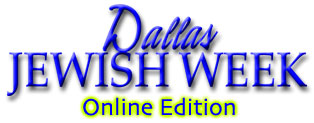|
Dallas Jewish Week Menu
|
 |
Writing blues
Northern Virginia Hebrew calligrapher seeks replacement
by Aaron Leibel
Arts Editor
Shulamit Widawsky is a painter, sculptor, writer and an educational therapist in private practice. She also is a Hebrew calligrapher. Due to medical problems and an interest in developing her other occupations, she would like to retire from the Hebrew calligraphy business. But she can't find a replacement and feels an obligation to the community not to simply quit.
"I've been doing calligraphy since I was 17 and want to move on with my life," says the Annandale resident. "I don't want to continue [as a calligrapher], but I feel stuck."
A member of Agudas Achim Congregation in Alexandria, she concedes that the Hebrew calligraphy work she does on ketubot could be sent to calligraphers elsewhere in the country.
"But if you have a Jewish community, you are missing pieces if you are always sending things out," she says. "Then, you're not really a Jewish community."
Her medical problems, however, may force her hand. Starting a couple of years ago, she noticed "she was having trouble making the pen do what I wanted."
Widawsky has been afflicted with shakiness and tingling and numbness in her hands and arms, She also suffered from neck and shoulder pain.
"As you can imagine, this makes calligraphy difficult," she says. "My hands weren't working. Instead of working for two or three hours a day, I could only work for a few minutes every few days."
She had trouble finishing her last two commissions -- full ketubot, instead of filling in the couple's details on standardized Jewish marriage contracts.
"One I brought to the site of the wedding on the morning of the ceremony," she says. "The other one was an anniversary ketubah, and I finished it eight months late."
Widawsky's physical ailments apparently revolve around back problems -- specifically a disc and a bone spur.
She has had two operations -- the second last month to remove part of her thyroid -- and she says her hands feel better. But her physicians are not sure she will be able to continue with her work.
She hopes that the calligraphy course she will be teaching, starting this week at the Jewish Community Center of Northern Virginia, will produce one or more "apprentices" whom she can teach and prepare to replace her.
She says she is the only Hebrew calligrapher in Northern Virginia working on ketubot. To her knowledge, there are none in the District and very few in Maryland.
Calligraphy came easily to her because she has always been an artist, Widawsky says. She was born and raised in Los Angeles in a "strongly Jewish family." Her mother was the first girl to have a bat mitzvah ceremony at her Conservative synagogue, and her father was president of his synagogue.
Widawsky went to Hebrew school, became bat mitzvah and was confirmed at a Reform synagogue. She also was active in the Southern California Federation of Temple Youth.
She graduated from the University of Judaism in psychology.
In 1980, at the age of 17, Widawsky started doing English calligraphy -- filling in the addresses for bar/bat mitzvah and wedding invitations -- "because it was something I could do and as a way to make extra money."
But she got into Hebrew calligraphy by accident. One evening in 1986, she was in the gift shop of the University of Judaism when she saw a print of a ketubah that cost $250. She was astounded by what she thought to be the high price. The price is exorbitant, Widawsky told the shop manager. And she added, "I could do that."
Two weeks later, the store manager called and told her he had given her name to customers who wanted a handmade ketubah. That was the beginning of 17 years of Hebrew calligraphy.
Due to her physical limitations, Widawsky no longer does ketubot "from scratch," but rather fills in printed ones with the name of the couple, date and other pertinent information.
She has produced her own printed marriage contracts -- Eitz Chaim ($250) and Lavender Rose ($180) -- that are for sale nationwide. Calligraphers who fill in the personal information receive $45-$60.
That work does not require an artist, she insists, but "someone with a steady hand and a good eye for visual-spatial relationships. It is a technical skill with some art involved, but you don't need to be an artist per se."
It is necessary, she says, to know something about the Hebrew alphabet, and how the letters are formed. It also helps, she says, to be familiar with the rabbis in the community, to know whether a ketubah might be acceptable to the officiating rabbi. An Orthodox rabbi, for example, would not accept a modern, egalitarian ketubah.
Widawsky has been looking for a replacement for two years. She thought she had found one in a District woman, but she moved to Florida.
Yet she is hopeful. "I turned 39 this month and would like to be done with calligraphy by the time I'm 40," she says.
Shulamit Widawsky will teach a course on Hebrew calligraphy at the JCCNV on four consecutive Tuesdays, starting Feb. 18 at 9:30 a.m. If you have your own materials, you may call the instructor at 703-280-1629 to see if they are sufficient. Otherwise, there will be a $4 materials fee. The course costs $60, $55 for members. For information or to register, call 703-323-0880.
This story was published in the WashingtonJewishWeek
on: Thursday, February 13, 2003
Copyright 2004, Dallas Jewish Week